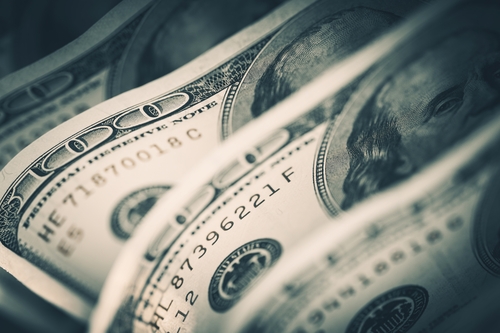While Paul is out of the office at a Commonwealth Conference, Brad McMillan weighs in on a few hot topics. Brad McMillan, CFA®, CAIA, MAI, managing principal and CIO at Commonwealth Financial Network®, the firm we partner with to serve you, addresses those troublesome headlines in his recent article, “The Dollar’s Staying Power and Other Reasons Not to Panic.” Brad offers an explanation of “panic memes” and evidence of why they aren’t, in fact, a reason for concern:
Recent news about bank collapses, the uncertain future of the U.S. dollar, and other worrisome scenarios have caused concern among investors—and sparked many questions.
Brad McMillan, CFA®, CAIA, MAI, managing principal and chief investment officer at Commonwealth Financial Network®, the firm we partner with to serve you, addresses those troublesome headlines in his recent article, “The Dollar’s Staying Power and Other Reasons Not to Panic.” Brad offers an explanation of “panic memes” and evidence of why they aren’t, in fact, a reason for concern.
As always, we strive to keep you informed and prepared to stay on track toward your financial goals. If you have questions about this article, please don’t hesitate to contact our office.
The Dollar’s Staying Power and Other Reasons Not to Panic
Presented By Paul Levin
In recent weeks, there has been much ado about the dollar. Questions and concerns have arisen about de-dollarization, central bank digital currencies, and what the government might do to your savings. The root of these concerns seems to be the notion that the value of the dollar will collapse sometime soon, making our savings valueless. Let’s address that core question, and then dig into similar scary headlines.
The Power of the Dollar
Simply put, the dollar can’t collapse in the short to medium term. Why not? Let’s imagine a hypothetical scenario. Suppose I told you that Amazon would collapse this year, and people would abandon it and flock to other merchants, like Walmart, for example. That seems somewhat plausible because Walmart is indeed a valid competitor, is spending a lot of money to take business from Amazon, and has the scale to do so credibly. That logic creates a good case that Amazon is going to collapse.
But when you think about it, the idea is a bit silly. For the millions of people who have an Amazon Prime account and multiple preset orders, who watch Prime video, and so on, it would be a lot of work and a major inconvenience to switch. Even if Walmart offered a full range of competitive services, it’s unlikely that tens of millions of people would suddenly endure the inconvenience of switching. The idea that Amazon will suddenly collapse simply isn’t credible.
In our parallel scenario, the U.S. dollar is Amazon, and the Chinese yuan is Walmart. Yes, China would like to dethrone the dollar, but it isn’t that simple. As long as the U.S. is the largest open trading economy, everyone in the world wants access to the U.S. economy, and it would create a lot of work and a great inconvenience to switch, the position of the dollar as the global reserve currency is secure.
No Other Choice
China itself holds more than $1 trillion—with a T—worth of assets. Why? When it sells things to the U.S., it gets paid in dollars. China must then invest those dollars. And since there are so many of them, the only real option is U.S. Treasury securities. So, even China is locked into not only taking, but holding, U.S. dollars. If China is still on the hook, and if Walmart is still doing business with Amazon, will Amazon really collapse?
But wait, there’s more. So far, we’ve assumed there is a real alternative to the dollar, but there isn’t. Three things make the dollar special: First, the sheer size of the U.S. economy. The only other currencies that even come close are the yuan and the euro. Second, the freely convertible nature of the dollar. The yuan’s exchange rate is determined by the Chinese government, not the market, which makes it very risky from a political perspective. That leaves only the euro as an option. And the final factor is the relative political and economic stability of the U.S. compared with Europe and China. When you look at all those pieces, the U.S. dollar is not only the established choice—and, in most cases, the smart choice—but the only choice. There really is no alternative.
Why the Buzz?
Frankly, all the talk of a collapse is nonsense designed to panic you into buying something the doomsters are trying to sell, often gold. This is a fad that has come and gone every year or two for at least the past decade. It wasn’t true in the past, and it isn’t true now.
Here’s more evidence: The dollar is now trading at just about the same level against other currencies as it has for the past several decades. It goes up and down, but we are still in the middle of the range. In terms of the markets, the dollar is still where it has always been. If we consider the markets as a warning system, they are still flashing green. When they start to turn yellow or red, that will be the time to worry—not now.
More Panic Memes Debunked
The dollar’s hypothetical collapse isn’t the only topic in our newsfeeds causing worry. Let’s examine some others:
- The collapse of the banking system. Although this one originated with the collapse of Silicon Valley Bank, you’ll notice that we haven’t seen any more bank failures in recent headlines. The government took the necessary steps to contain the problem, and here we are with no headlines. A good lesson for the rest of the list here.
- De-dollarization. As discussed above, the data shows this simply isn’t happening. The dollar remains reasonably strong, countries continue to want to sell to the U.S., and in almost all cases, there really isn’t an alternative. This also applies to the petrodollar headlines, which come up every few years but aren’t true.
- The Federal Reserve’s (Fed’s) negative cash flow. This concern stemmed from the panic about the banking crisis (which, as noted, isn’t a reason to panic) and poses the question, “Can the Fed go bankrupt?” The answer is no. According to Sam Millette, director of fixed income at Commonwealth, “The Fed was not created to generate profits, and this has never been a requirement. The central bank operates to promote maximum employment and stable prices. While, historically, it has been able to generate profits that have been remitted to the Treasury, this is not a requirement or even a formal goal for the Fed. The Fed is not a commercial bank that can suffer from depositor runs, and there is no risk of default.” In addition, it’s hard to go bankrupt when you can create money, which the Fed can.
- Central bank digital currencies. Speaking of creating money, the Fed is now exploring the notion of an official digital currency, and the scare headlines say this will replace the dollar and enable the government to surveil and/or confiscate people’s savings. The Fed is indeed looking at this notion but not with any sense of urgency. If the central bank does it, it won’t make much of a difference because most money is essentially digital now. When was the last time you paid your mortgage with cash? Do you use a debit card? This won’t happen in the short to medium term, but even if/when it does, it won’t make any more of a difference than switching from cash to credit/debit cards did. As for the risk of confiscation, an official digital currency wouldn’t make this risk any greater than it is now—and it won’t happen now either. This may remind you of the great 401(k) confiscation scare of a couple of years ago, which never happened.
The common theme is that some headlines take a real fact or trend and exaggerate it to scare people. Often, when you look back, you see this happening regularly every few years. Many people creating the buzz are trying to sell you something, not inform you. When you keep that in mind, it’s easier to stay unaffected by these headlines.
Are there things to worry about? Certainly, but they are generally large scale and slow moving. The good thing about them is we can track the data and see when we are getting into trouble. If we are tracking the problem, we usually can avoid it. We can’t always dodge trouble, of course, but there are tools available, like in the recent banking “crisis,” that can help limit or resolve the issue. There’s rarely a headline that warrants real panic. And that is the answer to these and similar headlines.
Certain sections of this commentary contain forward-looking statements that are based on our reasonable expectations, estimates, projections, and assumptions. Forward-looking statements are not guarantees of future performance and involve certain risks and uncertainties, which are difficult to predict. Opinions are subject to change without notice. Past performance is not indicative of future results. All indices are unmanaged and investors cannot invest directly into an index.
# # #
Authored byBrad McMillan, CFA®, CAIA, MAI, managing principal, chief investment officer, at Commonwealth Financial Network®.
© 2023 Commonwealth Financial Network®



